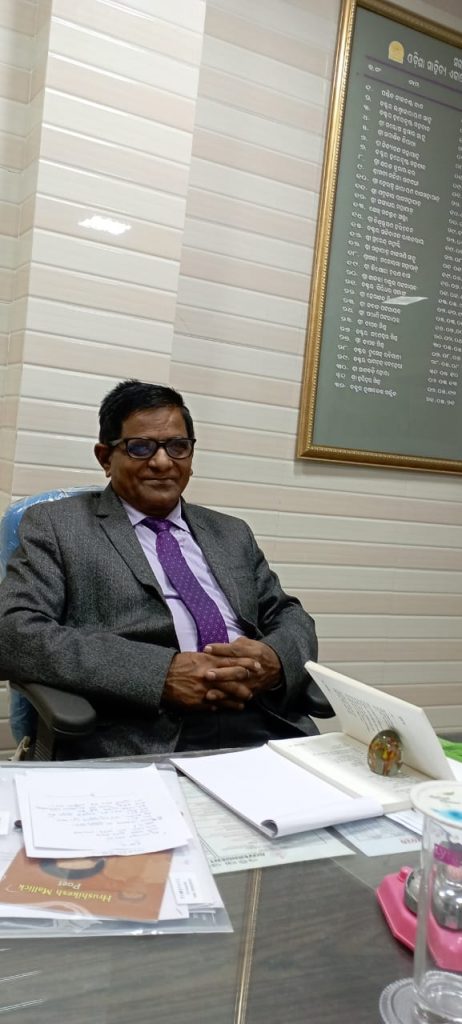After being honoured with several prestigious literary awards including the recent Sahitya Akademi Award for his outstanding contributions to Odia literature, noted poet Hrushikesh Mallick says his best is yet to come. Mallick, a trendsetter in Odia poetry writing, says he is happy that his works are liked by the readers and critics but he never writes with an objective to bag awards. Be it his state Sahitya Akademi award winning anthology Dhanasaunta Jhia or Jeje Dekhi Nathiba Bharata for which he was honoured with prestigious Sarala Samman, all his poems have left a lasting impression on the readers. The incumbent President of Odisha Sahitya Akademi, who has authored more than 40 books including 11 on poetry and 10 on literary criticism, took some time off from his schedule to talk to Sunday POST on a host of subjects.
Excerpts:
Congratulations on being selected for Akademi honour. First, tell us briefly about Sarijaithiba Opera.
Thank you. The anthology was first published in 2019. Like all my other poetry books, the poems of Sarijaithiba Opera are also about what I have experienced in life. In my poems, many events and characters that I have come across in life have shared their joys and sorrows in their own language and gone back to the unknown kingdom where they came from. Decline in ethical and moral values has always disturbed me and my reactions to those anomalies of life have been reflected in the poems of Sarijaithiba Opera. However, my reactions are not malicious in nature since they are apolitical.
What inspired you to write poems?
I got motivation from the environment. I have picked up the thread of poems from the seeds of creativity that were hidden in the deserted mango orchard, cloudy sky, the burning up of silk cotton flowers in the summer sun of my village. My aunt’s lullaby and fables have also played a part in my growth.
How did this anthology Sarijaithiba Opera come into existence?
All 45 poems of this book have their distinct plots. We have to pick one of them to put it on the cover of the book. However, I believe that the titles of many poems of this anthology deserve to become the heading of the book. I was in great pain to leave out the other titles that couldn’t make it to the cover.
Do you think this is the best creation of the literary journey you have made so far?
—No, not at all. My other poetry books also fiercely compete with this award winning work. At times, recognition and awards increase the stature of certain books which is beyond the control of a poet.
Did you expect the award for this particular book?
Sarijaithiba Opera meets all the standards of an award winning creation. I had this conviction from the beginning. My publisher was even more confident than me. However, I took him lightly.
Apart from poems, your literary criticisms, columns and works for children are also quite popular among the readers. What do you enjoy writing the most?
Be it literary criticisms, columns in newspapers or children’s literature, I get completely involved in each of them. Always, I remain conscious of what I am writing about. I adopt different styles of writing for different sections of literature. Therefore, I would say I am pretty comfortable in each segment and enjoy all of them.
You are heading Odisha Sahitya Akademi as well as in-charge of the literary section of Dharitri. How do you manage to get time for writing after discharging these major responsibilities? When do you write?
Proper time management is the biggest skill of a writer. If managed well, a writer can perform multiple tasks which has happened in my case. I have enough time for creative work despite my multiple engagements. I write every day if there is an urge for it. Often, a write-up picks its own time to be transformed onto the paper.
In the current climate of bans, trolls, and censorship how should writers insulate themselves and focus on writing?
Hurdles are not new to creative minds. They face such obstacles, criticism, and censorship (both written and unwritten) in all ages. A writer has to ignore them, concentrate on the task at hand and leap over. For that he or she has to create his or her own path. Things are bound to happen around the writer but he/she has to remain unaffected. Water droplets on a lotus leaf illustrate this distancing attitude and this is quite possible.
Finally, what would be your message to the young aspiring writers?
On this, I would like to recall an interesting anecdote involving the great poet Sachi Routray, an idol for many from our generation. I was fortunate to be very close to him. So much so that he used to write frequently to me. This made me a little complacent and one day, I went to him with some of my poems and requested him to make some corrections. It is still vivid in my memory how he responded to my request. ‘Poems are not like Mathematics which can be corrected. Recite them again and again and you would realise where you have gone wrong,’ he said to me. This is a foolproof method to improve on your work. Apart from this, young litterateurs need to express the experience in their own style and language. Because, there is a risk of going artificial, if your version is borrowed or indirect. One also needs to read a lot and write less to add quality to the work.
Bijay Mandal, OP

